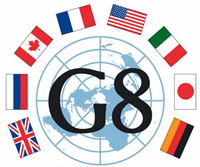G-7 was an organisation of seven non-socialist countries which were highly industrialised in the world G-7. included USA, Canada, Germany, Britain, France, Italy and Japan. After opting free market policies in the economy, Russia was also made the member of the organisation on June 21, 1997. At present, it is known as G-8.
The first G-7 summit was held at Rambouillet near Paris in November 1975. Initially,only five industrialised countries – USA, UK, West Germany, France, and Japan were its members. Later on, Canada and Itlay also joined it in 1976. Currently, G-8 countries include Britain, Canada, France, Germany, Italy, Japan, Russia and United States. The member countries of G-8 account for a 49% of global export, 51% of industrial output and 49% of the assets in the International Monetary Fund.
The 32nd annual summit of G-8 countries held between July 15-17, 2006 at St. Petersburg (Russia). Energy security topped the agenda of the G-8 summit along with education and fight against infectious diseases.
The 33rd G-8 summit took place in Hellingendomm (Germany) between 6-8 June 2007. Five big developing countries India, China, Brazil, Mexico and South Africa was invited in this summit.
The 34th G-8 summit took place in Tokyo on the northern island of Hokkaido, Japan from July 7-9, 2008.
The 35th G8 summit took place in the city of L’Aquila, Abruzzo, Italy on July 8–10, 2009.
The 36th G8 summit was held in Huntsville, Ontario in Canada, from June 25 to June 26, 2010. In this year’s meeting, the G8 leaders agreed in reaffirming the group’s essential and continuing role in international affairs and “assertions of new-found relevance.” The form and function of the G8 were reevaluated as the G-20 summits evolved into the premier forum for discussing, planning and monitoring international economic cooperation.
The 37th G8 summit was held between 26–27 May 2011 in the commune of Deauville in France.
Read Also: Nuclear Security Summit (NSS)
Group of 20 (G-20)
- The finance ministers of G-7 countries in September 1999 established G-20 as an international forum to promote informal dialogue and cooperation among systematically important countries within the framework of Batton Woods institutional system with a view to preserving international financial stability.
- An important distinguishing characteristic of the G-20 from the G-7 is its broader participation from among both the industrialised countries as well as key emerging markets, thereby representing a wider range of view points.
- Members of the G-20 are: Argentina, Australia, Brazil, Canada, China, France, Germany, India, Italy, Japan, Indonesia, Mexico, Russia, Saudi Arabia, South Africa, South Korea, Turkey, United Kingdom, United States, and the chairman country of European Union.
- During the inaugural meeting of the G-20 held in Berlin during December 15-16, 1999, the group deliberated on various prerequisites for a sound international financial system and highlighted the importance of the following initiatives to avert the global financial crisis.
Don’t Miss: IMPORTANT SUMMITS
- Formulation of sound national economic and financial policies.
- Strengthening of the national balance sheet.
- strengthening of sovereign debt management.
- Greater attention to the impact of government policies on borrowing decisions of private firms.
- Sustainable exchange rate regime supported by consistent exchange rate and monetary policy.
- Widespread implementation of codes and standards including transparency, data dissemination, and financial sector policy.
- Measures to strengthen domestic capacity, policies and institutions.
- The group welcomed the work of Bretton Woods Institutions and other bodies in the area of codes and standards and agreed to undertake the completion of Reports on Observance of Standard & Codes and Financial Sector Assessments.
- The group affirmed its commitment to progress towards multilateral trade liberalisation within WTO framework.
Also, Read:


